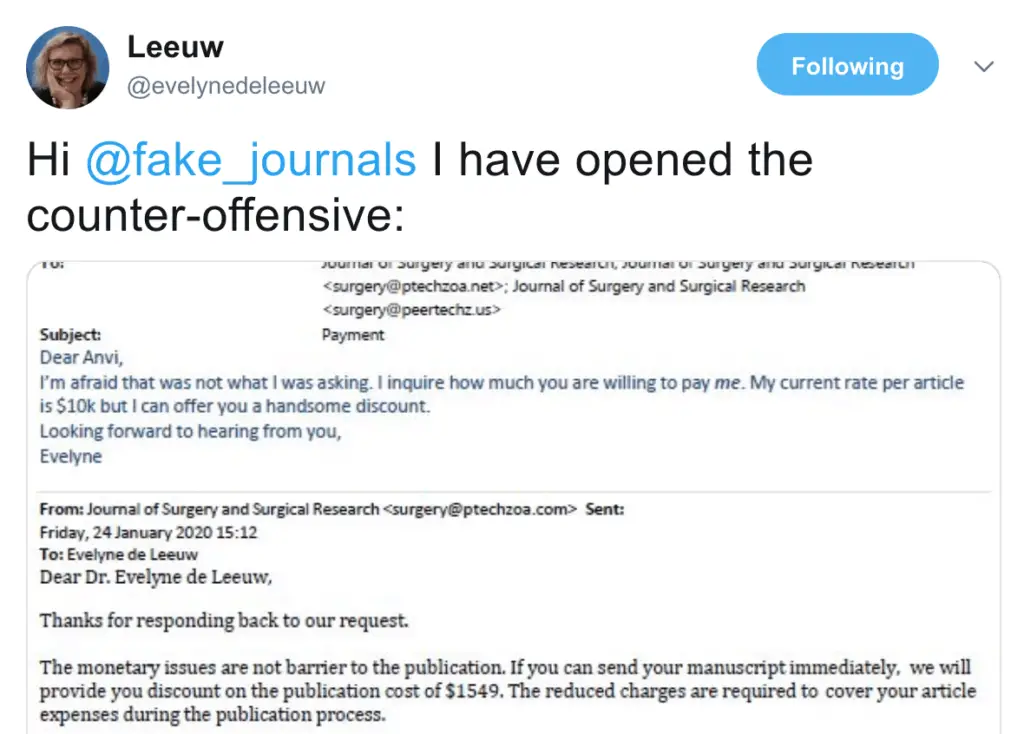Disclosure: This page may contain affiliate links. This means, at no additional cost to you, we receive a commission if you click through and make a purchase.
If you are a scholar, and sometimes even if not, you have probably noticed the increase in the number of emails that you receive asking you to submit your latest research to a particular journal. These are often, though not always, predatory journals. Their aim is to get you to submit a paper and then pay when it is published. If it is a predatory journal, rather than an legitimate Open Access journal, they will offer little (if anything) in terms of peer review and when you paper is published it will go into a very grey area of the scientific archive.
If you get an email from a (suspected) predatory publisher, what should you do? The answer is to delete it. But if you don’t want to simply delete it, this article may give you a few more ideas.
Delete
As mentioned above, your default action should be to delete the email. Just put it in the trash can and forget about it. Don’t waste your time reading it, trying to understand it, wondering why people send these emails – just hit the delete button and move onto something more important.
The rest of the ideas in this article are for those people who would like to get more engaged with predatory publishing, either to understand it a little more or just to try and be disruptive in order to waste the time of the predatory publishers, in the same way that they are wasting your time.
Unsubscribe
You might think that it is worth unsubscribing. It is probably not a good option.
Firstly, there may not be the option to unsubscribe, so you can’t do it even if you wanted to.
If there is an option, our advice would be to ignore it. At best, you will unsubscribe from this one list – and there are many more that will get you. But, bear in mind, that predatory publishers do not play by the same rules that we do. Areas such as GDPR will just pass them by. If you want more information about GDPR, take a look at The Ultimate GDPR Practitioner Guide: Demystifying Privacy & Data Protection or GDPR for Dummies .
By hitting unsubscribe, you are more likely to be telling them that this is a live account, with a real person at the end of it. This will only reinforce their view that it is an email address that should be in their database and they will continue to spam you. Moreover, they are likely to sell your email address to others, as they know it is live, and/or use it spam you for their other journals.
So, the advice is clear, do not unsubscribe.
Send it to us
If nothing else, they will bring a smile to your face, but they may serve as a warning to some of the phrases and modes of operation that predatory publishers use.
Use an email filter
If you want to stop receiving the emails but do not want to be bothered deleting them and do not to risk trying to unsubscribe, then most email systems will enable you to set up email filters. This enables any emails that match certain criteria to be dealt with automatically. This could mean automatic deletion or moving the emails to a certain folder which you you can look at from time to time just to check that your filter has not caught an email that it should not have done.
The key is to find some criteria that matches predatory emails. It might be from certain email addresses; it could be certain words in the subject line, or you may be able to identify certain words or phrases appearing in the body of the email.
It might take a bit of experimentation but if you can come up with suitable filters, it could save you many hours of time in the long run.
Submit something
GENERATE A PAPER
INCLUDE A HIDDEN MESSAGE
Strike up a conversation
Often, the predatory publisher will say that they are very excited about your previous work and they may even refer to one of your papers. In our experience it often appears that the paper being cited was chosen at random, suggesting that some sort of data collection (screen scraping?) was used. There is, in our experience, no correlation between the journal being promoted and the article being cited.
You may also find that the aims and scope of the journal, that is approaching you, is way outside your area of interest/expertise. Indeed, you may find that it is in a totally different discipline.
In the past, we have struck up the following conversations.
- “Thank you for recognising my high quality research. I just wonder what paper of mine you were looking at so that I can better understand the type of paper that you are looking for?”
- “Thank you for your email. I am glad that you found my paper so interesting and thank you for your invite to submit to your journal. It is not obvious to me how my previous work can fit into your journal and I wonder if you can tell how my previous paper is relevant to your journal. This will enable me to write a paper that meets the target audience of your journal.”
- “I am happy to receive your invite to submit to your journal. I do have an article in preparation, with a tentative title of “Some nonsensical title that means nothing.” Would this be of interest to your journal. I look forward to your response as I have the article almost ready to submit and was looking for a suitable journal?“
- if they really are “impressed with your research” ask what it is that drew them to you – which paper? If the discipline is different and they refer to one of your papers, ask them what they saw in your paper that relates to the discipline of the journal – as you can’t see it. Of course, you will never get a valid answer as they do not know the discipline, nor the article that they refer to. They probably just screen scrapped your email address.

- We liked a recent tweet from @evelynedeleeuw, where she asked the predatory publisher for money to publish her article. This might be a good strategy to employ. Of course, they will not pay you. but it keeps the conversation going and while they are talking to you, they are not talking to somebody else.




